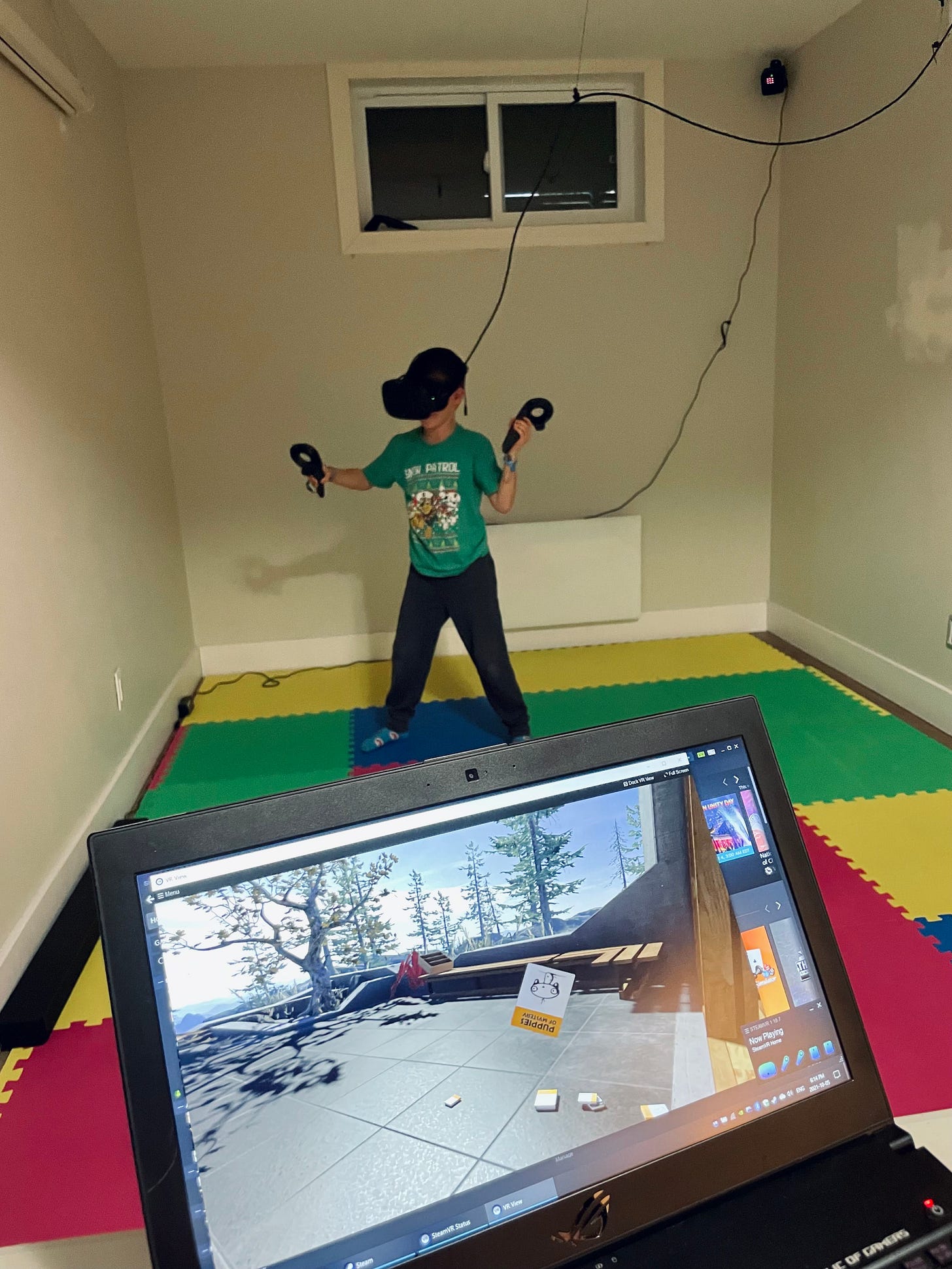187: Interrogative-led Questions, Facebook's Ashes, Google Making CPUs, Sarah Tavel, Tobias Carlisle, Virtual Unreality, The Looming Tower, and Roger Takes LSD
"we just press 'play' on the pre-recorded though"
Sometimes men come by the name of genius in the same way that certain insects come by the name of centipede; not because they have a hundred feet, but because most people cannot count above fourteen.
—Georg Christoph Lichtenberg
🚬 I believe there’s an extremely high probability that within a generation or two, people will look back on the idea of vehicles with tailpipes and factories with smokestacks the same way that we look back on dumping raw sewage and industrial chemical sludge directly intro rivers and oceans (which was the norm not that long ago, and still happens in many places — but at least now we definitely know it’s not a good idea and not a benign thing because “the ocean’s so big”).
What do you mean, grandpa? You used to burn toxic stuff and then release the fumes in the air, right next to where people live?
On a longer timeframe, things that can take out the combustion will do so (ie. running an electric car charged on solar/wind/nuclear/hydro/geothermal/etc), and those that can’t easily will be a lot more closed-loop (ie. ie some industrial processes will need to show that they’re capturing pretty much all toxic byproducts, planes will run on carbon-neutral synfuel).
Something like a coal plant, dumping tons of flue gas full of smog-forming particulate matter known cause of heart & lungs cancer, and endless quantities of fly ash full of mercury and other heavy metals that need to be dumped somewhere where it can leak into rivers and the water table (I know some is recycled into cement and that’s better than nothing, but this stuff still happens)…
That’ll just sound unthinkable (it’s already the case with a decent fraction of the population, but far from everyone).
🐌 Look who I met on my morning walk yesterday:
The depth-of-field effect is pretty decent on the iPhone 12 Pro with the 2x lens at close range… 🤔 Look at how the ground is blurry in front and behind the snail (or maybe this is more a slug?).
👹 Sometimes an impressive *but* imperfect person can teach you in two ways: what to do AND what not to do. That can be valuable, as long as you’re dialed-in enough to know what’s what, and not in wholesale imitation mode (that’s why you shouldn’t worship people or put them on pedestals — we’re all just people doing our best).
The obvious examples that may come to mind are people like Elon, Steve Jobs, Bezos, etc. But this also applies to your friends and coworkers.
You’ll always learn a lot more if you can learn from anyone, and from both good and bad traits. If you restrict yourself to the “famous role models” and only assume that everything they do is good because of some halo effect from their success, you’re likely to inject a lot crappy datapoints into your model of reality.
h/t friend-of-the-show Tom Morgan for a conversation that made me think of this
💚 🥃 The price of a couple coffees or one alcoholic drink isn't a bad trade for 12 emails per month (plus 𝕤𝕡𝕖𝕔𝕚𝕒𝕝 𝕖𝕕𝕚𝕥𝕚𝕠𝕟𝕤) full of eclectic ideas and investing/tech analysis. That’s 77¢ per edition.
If you make just one good investment decision per year because of something you learn here (or avoid one bad decision — don’t forget preventing negatives!), it'll pay for multiple years of subscriptions (or multiple lifetimes).
As Bezos would say of Prime, you’d be downright irresponsible not to be a member, it takes 19 seconds (3 secs on mobile with Apple/Google Pay — if you don’t see paid options, it’s because you’re not logged into your Substack account):
Investing & Business
‘Favor interrogative-led questions over leading questions.’
This is something that in the right context, like a lawyer questioning a witness on the stand or a cop asking a person of interest to describe what happened in the interrogation tank, or if asked about directly, most of it probably have no trouble grokking.
The problem is, a lot of the patterns we think daily are cached thoughts (ie. we don’t think, we just press “play” on the pre-recorded thought) and so we may have some very sub-optimal patterns that we don’t even notice anymore.
Below is one that I’m going to try to improve. Maybe you’ll find it’s something you want to do better too:
Favor interrogative-led questions over leading questions.
A leading question attempts to get the listener to agree or disagree with a premise you feed to them.
An interrogative-led question often begins with the words: who; where; what; when; why.
Imagine the responses to these two questions:
- "Did you like the movie?" (Leading)
- "What did you think about the movie?" (Interrogative-led)
How do each of these questions make you feel? How comfortable would you be saying something you think would displease the asker in each case. What kind of responses are possible/likely in each case?
Of course, you can always be talking to someone who's not interested in talking. It's possible to answer either question with a word or two. So there's some assumption of willingness to participate. Even so, you can still sometimes use carefully-chosen interrogative-led questions to find reasons for the disinterest.
Asking good interrogative-led questions is essential for above-average results in many pursuits: science; engineering; interviewing; and negotiation; to name a few. It can also be an important way to de-escalate tense situations. I've found it especially useful when talking to subject matter experts when trying to learn something about areas I know little.
Here's an actionable way to apply the idea. The next time you find yourself asking a question that doesn't begin with {who, where, what, when, why}, stop yourself and rephrase it to begin with one of those words. What differences do you notice in how the conversation goes compared to similar conversations you've had in the past?
This doesn’t just work for people, it’s also the best way to go with search engines, if you want to reduce confirmation bias:
I also find a similar technique useful when searching online.
If you search "do Aliens exist?" or "does teflon cause cancer" you're guaranteed to find articles that match the bias of your question.
Instead, search "extraterrestrial life" or "teflon health effects" or similar terms that are likely to match articles that both agree and disagree with the premise in question. You will end up significantly more informed from the results.
Source. h/t Trung Phan
Interview: Sarah Tavel, Partner at Benchmark
Interesting conversation between friend-of-the-show Shane Parrish and Sarah Tavel of Benchmark:
After every interview with her, one of the main thing I always take away is the importance of focusing on the right metrics, and being very careful of optimizing for the wrong things/KPIs.
I love her business-builders’ view of trying to figure out what the “main action” is for the businesses she’s been involved with (like Pinterest), and trying to figure out ways to encourage and remove friction for users to do more of that.
So rather than focus on monthly-active users (MAUs) or some fuzzy metric like that, a company like Twitter should figure out what it’s most engaged users do and try to make it easier to do more of that. Maybe it would even make them realize that they should bring the direct message (DM) system in the 21st century and give it table-stakes features that every other messaging platform has…
Conversation: Tobias Carlisle & Jim O’Shaughnessy
I enjoyed this conversation between Tobias Carlisle and friend-of-the-show and supporter (💚 🥃) Jim O’Shaughnessy.
Tobi has always been one of the most thoughtful members of the Fintwit community, and it’s always great to hear what he’s been thinking about lately (like in his episode with another friend-of-the-show and supporter (💚 🥃) Bill Brewster, Sun Tzu and other old masters from ancient Greece make an appearance):
Don’t Chase the Wrong Things
Science & Technology
Coroner Cloudflare on Facebook’s Massive Outage
Facebook had a pretty big outage earlier this week (which affected the blue app + Whatsapp, Instagram and Occulus), I’m sure you’ve heard about it because it was “the topic” for that day. It was bad enough that even Facebook engineers couldn’t log into their stuff to try to fix it…
If you’re curious about what happened, there’s a short post by Facebook, and a great one by Cloudflare (these people never sleep). I like the latter because it teaches not only about Facebook, but about more fundamental parts of internet infrastructure, which is why I think it’s interesting:
BGP stands for Border Gateway Protocol. It's a mechanism to exchange routing information between autonomous systems (AS) on the Internet. The big routers that make the Internet work have huge, constantly updated lists of the possible routes that can be used to deliver every network packet to their final destinations. Without BGP, the Internet routers wouldn't know what to do, and the Internet wouldn't work.
The Internet is literally a network of networks, and it’s bound together by BGP. BGP allows one network (say Facebook) to advertise its presence to other networks that form the Internet. As we write Facebook is not advertising its presence, ISPs and other networks can’t find Facebook’s network and so it is unavailable.
It’s like if all of a sudden, ever internet router’s “contact file” didn’t have Facebook’s info anymore. Oops.
Compounding the issue — as always — is human nature:
But that's not all. Now human behavior and application logic kicks in and causes another exponential effect. A tsunami of additional DNS traffic follows.
This happened in part because apps won't accept an error for an answer and start retrying, sometimes aggressively, and in part because end-users also won't take an error for an answer and start reloading the pages, or killing and relaunching their apps, sometimes also aggressively.
This is the traffic increase (in number of requests) that we saw on 1.1.1.1:
That’s 30x the usual DNS traffic. Yikes.
Google Making Its Own ARM CPU for Chromebooks
Following Apple’s lead with the M1:
Google is developing its own central processors for its notebook and tablet computers, the latest sign that major tech players see in-house chip development as key to their competitiveness.
The U.S. internet giant plans to roll out the CPUs for laptops and tablets, which run on the company's Chrome operating system, in around 2023 [...]
The new CPUs and the mobile processors that Google is developing are based on the chip blueprints of Arm
2023... This isn’t something you can just do overnight.
Even if they’re apparently building on Cortex cores (though that phrasing is a bit ambiguous — I’m not sure if Google has an architecture license from ARM like Apple does..?).
Every time you see some new hardware come out, you have to remember that it’s been in the pipe for a few years.
Amazon, Facebook, Microsoft, Tesla, Baidu and Alibaba Group Holding are all racing to build their own semiconductors to power their cloud services and electronic products. [...]
Peter Hanbury, a partner at consulting firm Bain & Co., told Nikkei Asia that the cost of designing a cutting-edge 5-nm chip is now around $500 million, compared to about $50 million to develop a chip using more mature production technologies, such as 28-nm tech. (Source)
Reminds me of the Alan Key quote:
People who are really serious about software should make their own hardware.My oldest son trying VR for the first time
I didn’t buy all this stuff, this is at a friend’s place.
He really enjoyed it. I was surprised at how quickly he got all the UI metaphors and how it all felt pretty natural to him. He’s seen some videos of people doing VR on Youtube, so it wasn’t entirely a new concept to him, but it feels like after the ‘digital natives’, we’ll quickly have the ‘VR natives’…
The Arts & History
Interview: ‘Lawrence Wright: The 20th anniversary of the 9/11 attacks’
I mostly post stuff on the “arts” side of the divide here, but this one is “history”.
It’s an interview with Lawrence Wright, who won the 2007 Pulitzer Prize for his book ‘The Looming Tower: Al-Qaeda and the Road to 9/11’.
It’s 3-hours long, but I found it interesting and it seemed shorter than that (well, I did listen at 2x, so it was more like 1.5 hours, but it seemed even shorter than that), and as someone who hasn’t dug extra deep into these events in recent years, I learned many things about the FBI-CIA SNAFUs and about how laughably ineffective Bin Laden had been in Afghanistan agains the soviets, despite the reputation he built for itself.
The part where they discuss how much more free the U.S. was in many ways before the attacks, and how we tend to forget that, was also a nice ‘wake up’ moment. It’s so easy to get used to things, and forget what we lost (even not being American, it’s still a loss for the world).
Lots of touching and incredible stories and anecdotes too. It’s a heavy topic, but sometimes you gotta go to the heavy topics.
Update on my Mad Men rewatch, LSD Edition
A few days ago, I rewatched Mad Men S5E6, the one where Roger takes LSD and Don and Megan take that trip… what a great episode, such interesting character writing and neat trick with the structure. Some deeper truths about how relationships can go wrong.
How Don acts when angry, and then lives to regret once he’s cooled off reminds me of the Seneca quote I had at the top of edition #185:
The greatest remedy for anger is delay.
—Seneca
If only he had waited and cooled off a bit before doing anything…







